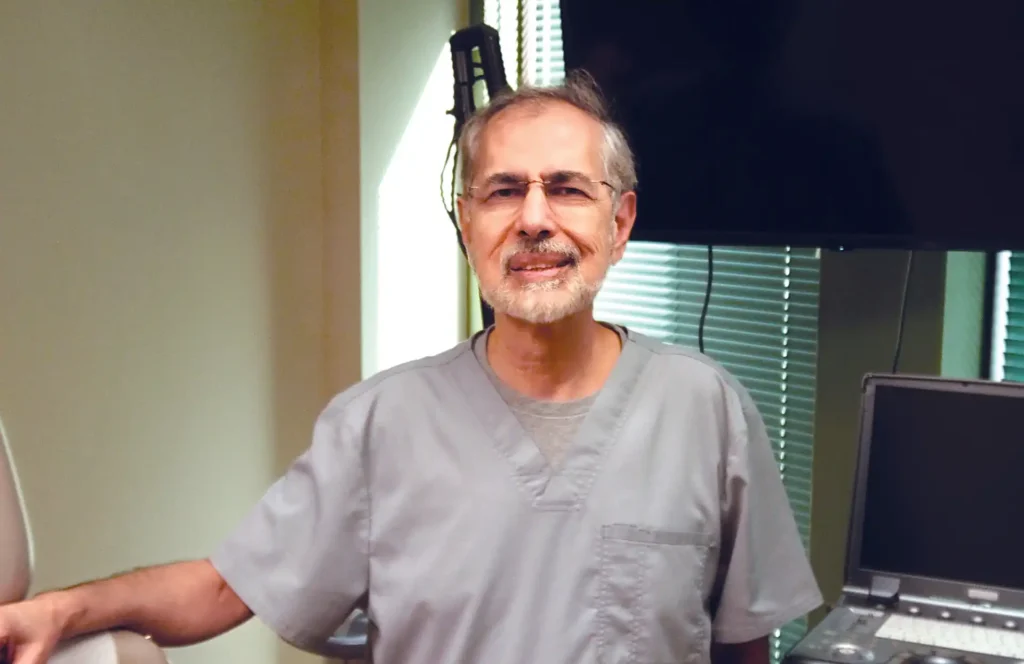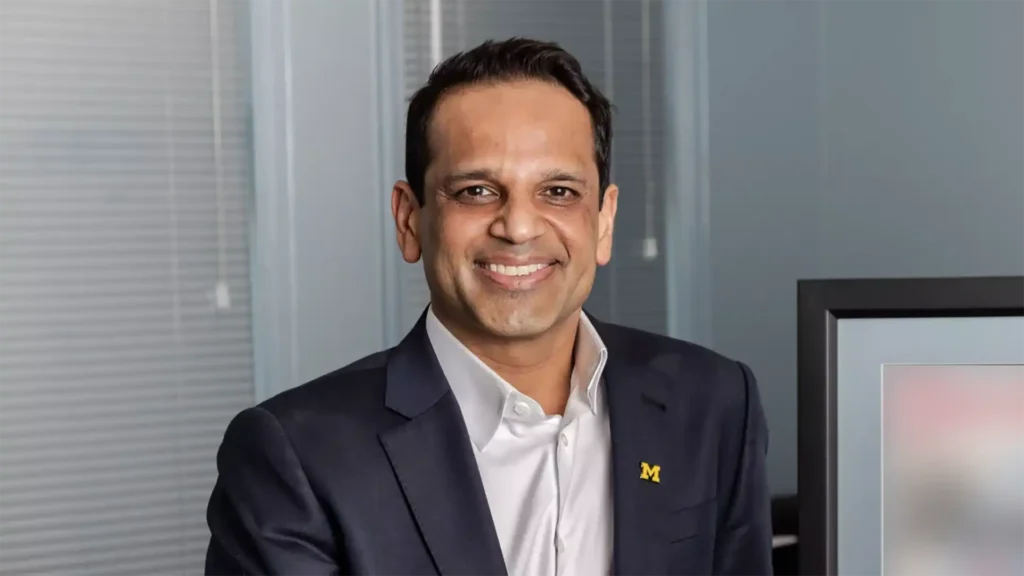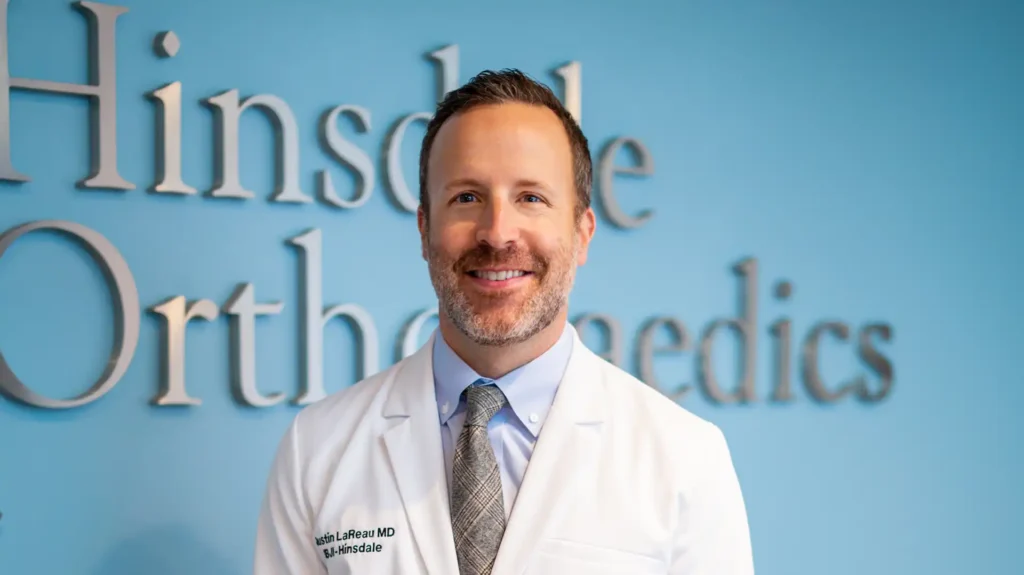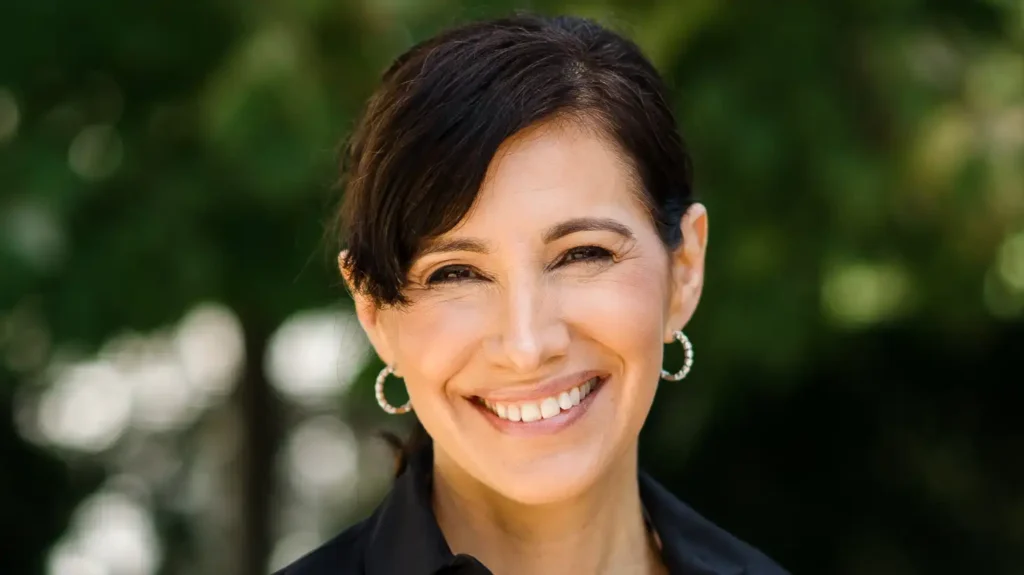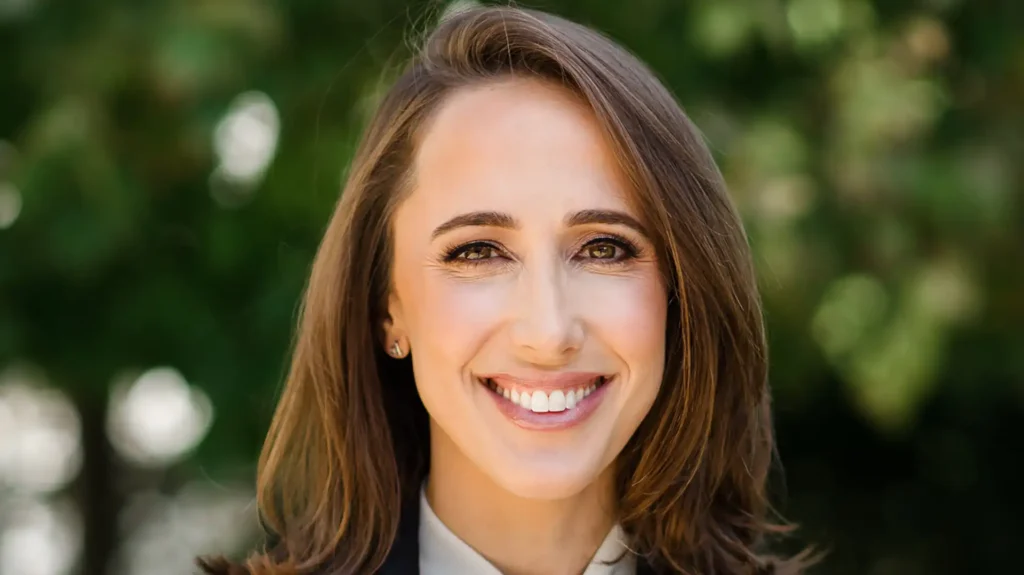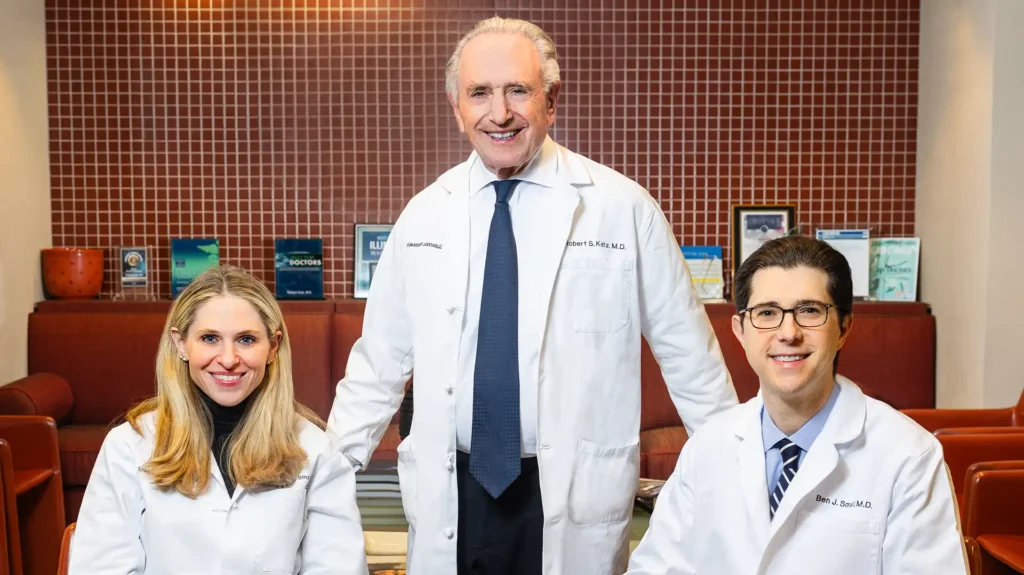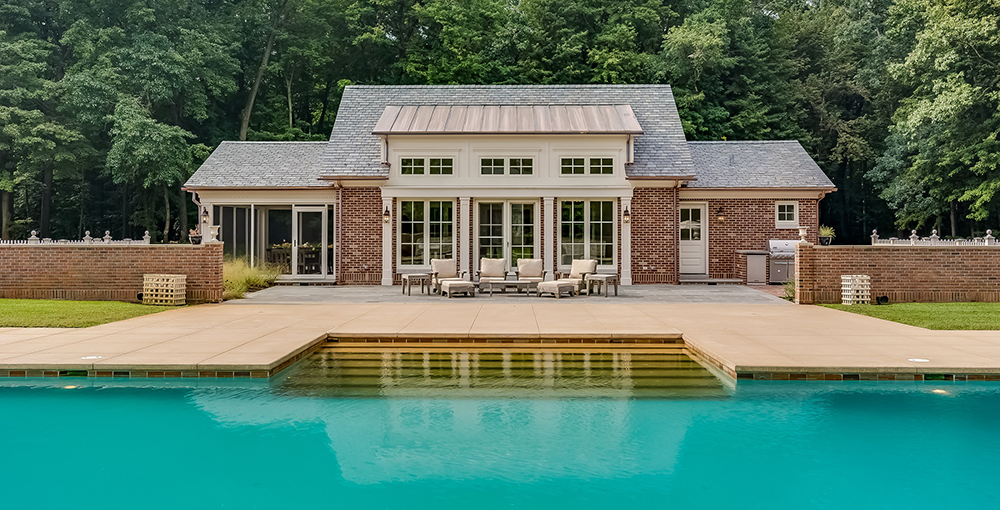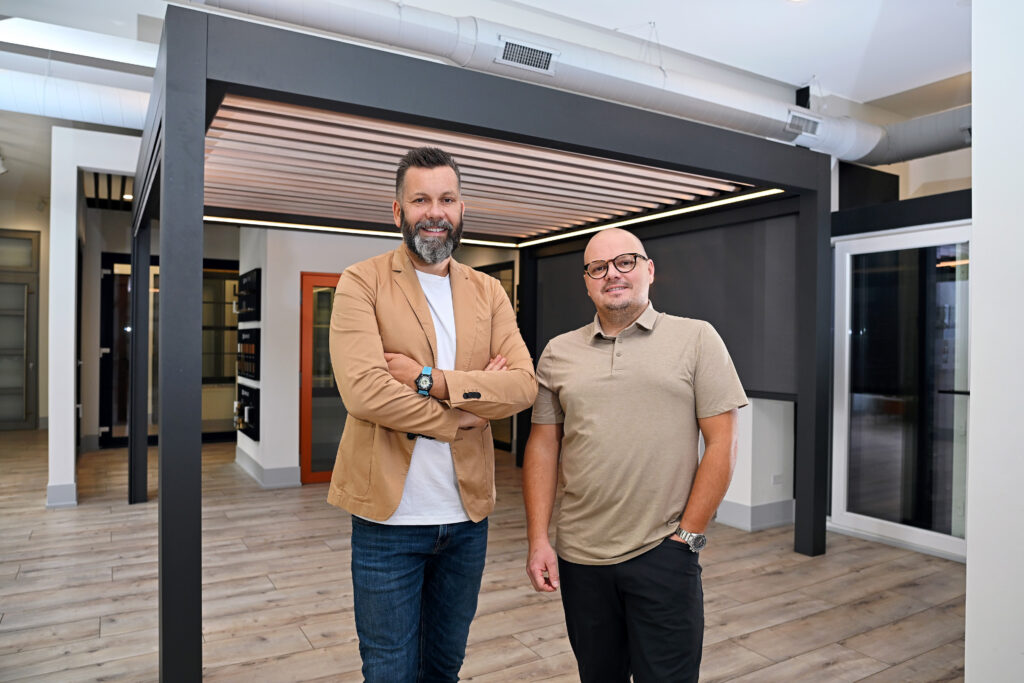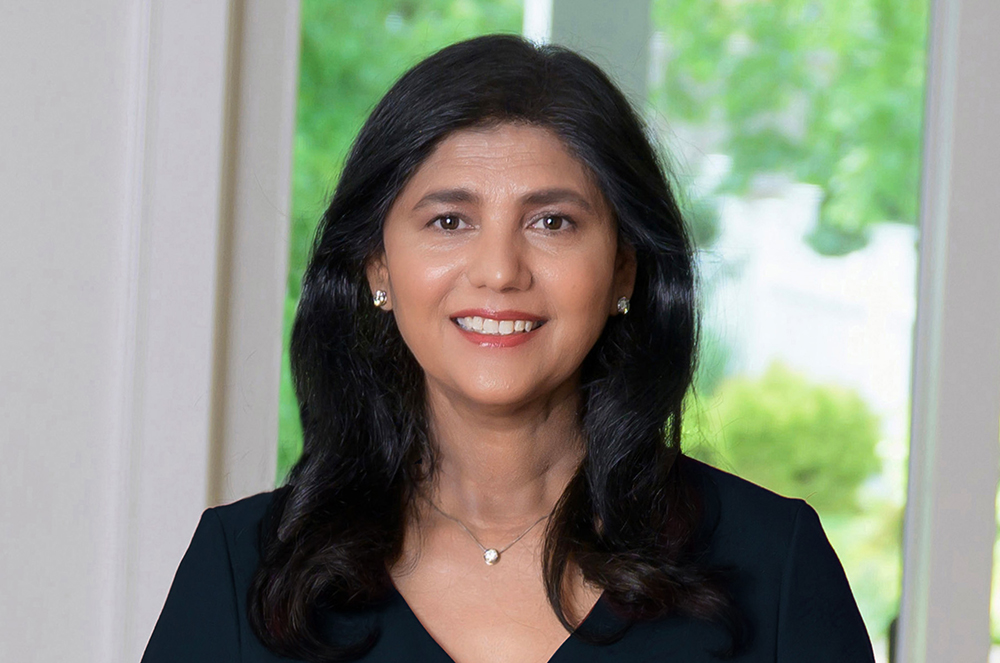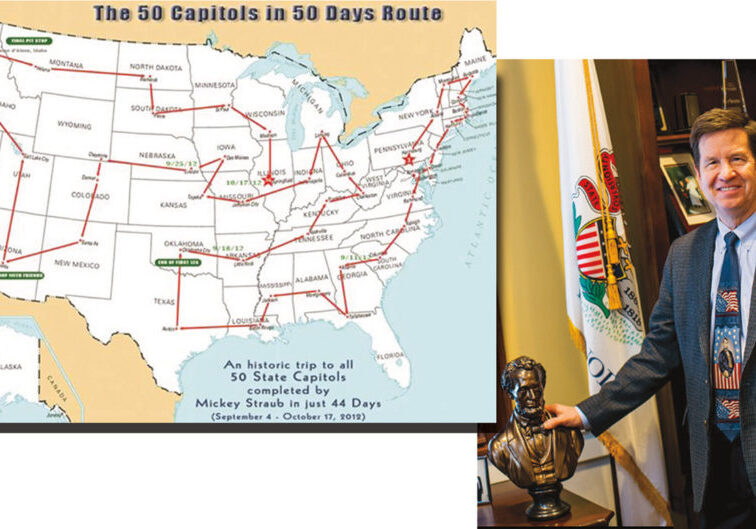
In the Spring of 2013, Mickey Straub was elected mayor of Burr Ridge. But what he did the previous fall was a even more impressive accomplishment.
By Mike Ellis
We all set goals for what we would like to accomplish in life. Some are fleeting and quickly abandoned; others pass by so rapidly we barely stop to acknowledge their fulfillment. Then there are those ambitious things we plan to do that always seem far from happening—and in many cases, we never actually undertake them. In the fall of 2012, Mickey Straub of Burr Ridge, now mayor of the same town, set out to become the first man to recite the Gettysburg Address at all 50 U.S. capitols—on a road-trip that would last 50 days. Straub said he was seeking to answer the question of whether God and Abraham Lincoln are still present in America.—Oftentimes he found his questions were answered in unexpected places.
Before the Journey
The youngest of six, Mickey Straub grew up in Pennsylvania, the state in which President Lincoln recited the Gettysburg Address. “I’ve always been a die-hard patriot,” Straub said. “I’ve always felt a great attachment to Abraham Lincoln, because of the Gettysburg Address.” After college, Straub worked in the Department of Defense in Washington, D.C., and later in Los Angeles. He said it was while working for the federal government that his patriotism probably “flourished.” “When I lived in Washington, D.C., I used to love to go down to the capitol building and sit down on the Lincoln steps and visit the Lincoln Memorial,” Straub said. He then switched gears, entered the insurance industry, and was transferred to Chicago 30 years ago in 1983. About a decade later, Straub started his own company, Sales Activity Management (SAM), which helps businesses achieve their goals through an empowering concept he calls “activity management.” Little did he know that he would use the same goal oriented approach he exhorts major insurance companies to employ on his circuit around the nation years later. Over the past few years, Straub said his interest in Lincoln grew, as he received a number of photos and books from a library in his home state, Pennsylvania. He now owns an extensive collection of Lincoln books and memorabilia, on display both at his SAM office and at his mayoral office at village hall. But Straub said his initial idea of visiting all 50 state capitols did not involve reciting the Gettysburg Address or Lincoln at all. “When I thought about this trip, doing the 50 capitols, my original thought was to take my daughter on the trip, and go to visit every capitol over an extended period of time,” he said. “Three years before I left, I had this idea that would coincide with my goal setting philosophy to set big goals in short deadlines. So, I thought of 50 capitols in 50 days, and I bought that Web site.”
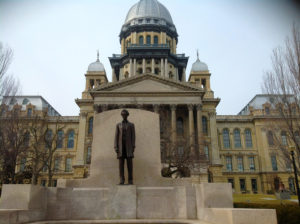
At this juncture, Straub had developed a concept, but had yet to develop anything specific to “do” at the capitol buildings themselves. About 18 months later, Straub visited the Illinois capitol in Springfield. Inside, he approached two men seated at the tour desk, and asked, “I know this is kind of a strange question, but can you tell me if God is still in the capitol?” “I also wanted to find out if America still believed in freedom,” Straub said. “Lincoln really personified his strong belief in freedom, towards the Union, and his belief in God. During his presidency, he quoted Scripture more than any president probably before or since. “I thought, ‘If I go in the spirit of Lincoln, I wouldn’t offend anybody, and I’d help unify people, because everybody loves Lincoln’—at least, so I thought.” His objectives becoming clearer, Straub prepared to embark on what you might call a personal fact-finding mission that would take him across America in 50 days. “I was kind of on a treasure hunt,” he said. “I wanted to take pictures of anything that referenced God, liberty or Lincoln. “It was all really for love of country. I wanted to it for the veterans, because in the Gettysburg Address, Abraham Lincoln reminded us that, ‘These dead shall not die in vain.’ So, if we as a country lost our love of liberty and freedom, the dead would have died in vain.”
Northeastern trials
Straub left Burr Ridge and arrived in Gettysburg, Pennsylvania—a fitting starting point for his national tour—on Sunday, Sept. 2, 2012. Spending the next two nights in Gettysburg, he departed from the home of David Wills—the site at which Lincoln completed the Gettysburg Address a century and a half ago—on the morning of Tuesday, Sept. 4. His vehicle of choice was an apropos 1997 Lincoln Town Car, which he had purchased out of Madison, Ala., especially for this purpose. “I didn’t want to make it silly,” Straub said. “I thought about doing push ups at every capitol, but that wasn’t very significant. “The Gettysburg Address I think contains within it the secret to our country’s future. It helped unify our country 150 years ago. I wanted to subtly promote our founding principles through Abraham Lincoln and the Gettysburg Address.” Determined to make his journey as a “common man” by driving most of the trip instead of flying, the modern-day de Tocqueville excitedly left a host of family and friends in Gettysburg for Harrisburg, the site of the first capitol on his tour. Straub said he only planned between one-third and one-half of the ambitious, 14,000-plus mile trip in advance, acknowledging that he vastly underestimated the difficulty of his undertaking. “When I left for Pennsylvania, I thought it was all smooth sailing and would be easy,” he said. “This trip was the toughest thing I’ve ever done in my life. “I had practiced what happened inside the capitols, but I never practiced what happened between capitols,—and that was a big flaw.” What made the initial portion of the trip especially difficult is that no capitols in the Northeast are open on weekends, and Straub departed from Gettysburg the Tuesday after Labor Day. Therefore, he had to visit ten capitols in just four days—that is, three capitols on two days, and two on the other two. It takes about five hours to drive from Harrisburg, the capital of Pennsylvania, to Albany, the capital of New York, so Straub said he had to hurry just to make it to the second capitol on his journey before it closed. “I got to New York, and it was 4 p.m.; and the personnel stops working at 4 p.m., so the place was kind of empty,” he said. “I went from all kinds of people, surrounded by friends and family, to being alone.” At 7 p.m. that evening, Straub left for Vermont in a driving rainstorm. He missed a turn at Lake George, and beset by the circumstances, was beginning to second-guess his trip. “I wanted to quit on the second day of the trip,” Straub said. “I was 30 miles out of the way in a rainstorm, and my windshield wipers stopped working. “I woke up the next morning and said, ‘What am I doing this for?’ I just risked my life last night—I almost killed myself—, I was tired, I was getting lonely, and I was already wondering why I was doing this.” Straub said he realized he would have to use his own goal-setting techniques in order to succeed on the journey. “Even though I preach and profess being efficient and organized, I had gotten into bad habits myself,” he said. “That was very humbling.” In Montpelier, Vermont, Straub was reinvigorated by a woman named Michelle Bean from the Secretary of State’s office, as well as Rep. Warren Kitzmiller, D-Vt., who recited the Gettysburg Address with him at the capitol. “They pumped me up, and gave me the energy to keep going,” he said, reminiscing over the first of many “capitol angels” that assisted him along the way. From Vermont, Straub still had to traverse through Maine, New Hampshire, Massachusetts, Rhode Island, Connecticut, New Jersey and Delaware by the end of the day Friday. He said he initially intended to fly home for a wedding back in Burr Ridge that weekend, but decided to change his plans once he knew the demands his journey entailed.
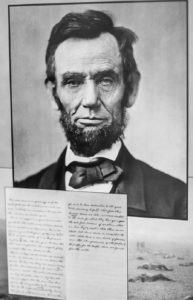
Getting acclimated After the frenetic northeastern portion of his trip, the pace began to slow down a bit in Annapolis, Maryland, which Straub described as a “turning point.” “Maryland was definitely a turning point, because I knew I got through the first week, and I had ten capitols under my belt,” he said. “I knew about what it would take, but I still didn’t quite have it down-pat yet.” Reaching the Southern states, he said he was uncomfortable reciting the address here, as there was no trace of Lincoln to be found. “It was very uncomfortable reciting the Gettysburg Address in Annapolis, Maryland, because I couldn’t find any reference to Lincoln in Maryland or Delaware,” Straub said. “I was thinking, ‘This is a southern state;—were they for Lincoln or against Lincoln?’” In Annapolis, Straub met a firstyear Naval Academy student in a white sailor’s uniform, who he said provided useful advice that helped him moving forward. “Here I was, a relatively successful businessman, a mature adult, and I was asking a freshman in college for advice,” Straub said. Entering the Deep South, he was joined by Chris Faron, a fellow parishioner at St. Isaac Jogues in Hinsdale, in North Carolina. Straub said he did not realize how helpful Faron would be until he arrived. His companion showed him how to organize photo albums of the trip on his iPad, post updates to social media, while making the long, 432-mile drive from Baton Rouge, Louisiana, to Austin, Texas. Proceeding from Texas to Oklahoma City, Straub concluded the first leg of his tour of America there, having visited 22 of 50 capitols. At this time, he briefly flew home to spend some time with his family. “I never wanted to go on the trip and lose contact with my family,” he said.
Resuming the journey
After flying back to Oklahoma City, Straub returned to the road, following Interstate 40 into Arkansas and Tennessee, before proceeding to Kentucky and West Virginia. While in Tennessee, he stopped at the famous Graceland in Memphis. The state capitol down the road in Nashville being closed for renovations, Straub was unable to go inside—one of two capitols he did not enter during his journey. Pivoting in Charleston, West Virginia, he turned westward from Ohio all the way to California, stopping to return home one night between his visits to the Michigan and Indiana capitols. When he reached Denver, Straub said he was exhausted. Since resuming his trip from Oklahoma City, he had visited 12 capitols in 12 states without a reprieve. To compound matters, he was also entering serious altitude for the first time on the trip. Once again, Straub said he was visited by “capitol angels” at a most exigent hour. “I woke up; I felt like I was paralyzed,” he said. “Before I left the bed, I prayed that God would give me the courage and strength to carry on. “I dragged myself out of bed, got myself [to the capitol] by 8 in the morning.”
At the capitol, Straub met Marisela, a maintenance staff member who directed him to the Lincoln statue, as well as an Idaho pastor who supplied him with a remarkable blessing. “She said, ‘I want you to know that God will give you the courage and strength to carry on.’ Call it coincidence, call it serendipity, call it divine intervention—I’m not sure what to call it to this day—, but the very two things I prayed for that morning, she told me that I would be given.” Feeling reenergized after leaving Denver, Straub swung down to New Mexico and Arizona, before returning northward to Salt Lake City, where he met up with fellow Burr Ridge resident Dick Coan. “When Mickey decided to do the trip, I said to him, ‘I’ll be glad to help you however I can,’” Coan said. Coan assisted Straub by driving, which helped the latter get some much-needed rest. “I kind of questioned—why am I going to do this?” Coan said. “But it was an amazing trip. He’d walk around the capitol buildings, and he would talk to people. He was very well-received. Even when we drove around and stopped for gas, he would share [his story] at small gas stations in the middle of nowhere.” Coan remained with Straub until they arrived in Sacramento, California, passing through Boise, Idaho, and Carson City, Nevada, beforehand. At this time, Straub took to the skies again to reach Hawaii’s capital, Honolulu, in the middle of the Pacific. He had been giving out five-dollar bills, (which bear Lincoln’s likeness on the front,) throughout the trip to people who provided him with exceptional service or stuck out for their kindness. Coming across a homeless man in Honolulu, he extended the same offer; but the man surprisingly turned him down. “He refused it, and he said that there were other people who needed it more than he does,” Straub said. “I was shocked by that [encounter].” Flying back to the contiguous states after spending the night in Hawaii, Straub darted northward for the Pacific Northwest before heading back towards Springfield—the final destination on his month-and-a-half-long journey. The North Dakota state capitol in Bismarck proved to be the second he could not enter, as Straub discovered the building was not open on weekends during the fall. But he did learn a great deal about the state from the archives director, who also recited the Gettysburg Address with him. In Madison, Wisconsin, the penultimate stop, Straub was joined by members of Gov. Scott Walker’s staff; together, they all read the address on the capitol steps.
“I woke up the next morning and said, ‘What am I doing this for?’ I just risked my life last night—I almost killed myself—, I was tired, I was getting lonely, and I was already wondering why I was doing this.”
Summing it all up
Concluding his national tour in Springfield, Straub had visited all 50 states in the Union (including Hawaii and Alaska), racked up over 14,000 miles in his 1997 Lincoln Town Car, and spent the night at 33 different hotels. The trip originally planned for 50 days actually took only 44.—And Straub even had time for two brief flights home. He exhausted about 650 gallons of gas, stopping 43 times, and spent a considerable amount of time at Starbucks, Subway and Shell. His records indicate 45 God, 27 Lincoln and 50 liberty “sightings”—the last of which can be attributed to the little-known fact that 48 state capitols have Liberty Bell replicas on site, which were placed courtesy of the U.S. Department of Treasury in 1950. He said Lincoln was generally beloved by those he encountered—with the exception of a man he met in Little Rock, Arkansas, who in the spirit of obstinacy called him a carpetbagger.” Straub said on the whole, the trip helped him put things in perspective and get his priorities straight. “The one thing that changed me forever was something I realized coming across between Wisconsin and Illinois—I realized that my priorities are very clear now,” he said. “My priorities now are God, family and country. Now I said that before, but honestly I didn’t necessarily practice it.” Ironically, while Straub sought to uncover some of America’s values and virtues at its physical state capitols, he gleaned a lot more from the people he met along the way—his “capitol angels” who left an indelible impression. “When I was done with the trip, I realized I had done something very special and impactful in my life,” he said. “It renewed my spirit in the American people in general. “What I was probably most surprised at was the remarkable kindness I was greeted with. Alexis de Tocqueville wrote a book, Democracy in America, where he talked about America is great, because America is good. I believe America is still good. “It didn’t matter if they were black, white, Asian; it didn’t matter if they were rich or poor, in tattoos, piercings,—they were all equally accommodating and helpful to me on this trip.” As one of his neighbors told him, “Mickey, you’re going to capitols looking for God, but you found God everywhere.”



